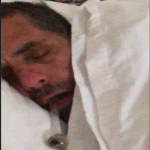Tatty,tattooyu wrote:Hey Rooster, why dentists?
It is starting to catch on:
Fixing Dental Problems May Help You Rest Easy Reporting
Kristyn Hartman CHICAGO (CBS) ―
Some dentists aren't thinking about just your mouth anymore. Dr. Gerilyn Alfe asks her patients about their sleep habits.
"There are a number of dental issues that are secondary to someone not sleeping well," Dr. Alfe said.
For instance, clenching or grinding your teeth can get in the way of a proper night's rest.
Nicole Mortara didn't make the connection.
"No, not at all, actually," Mortara said.
Until Dr. Alfe's line of questioning revealed:
"I woke up tired every morning. It didn't matter if I slept five hours or if I slept 10," Mortara said. "I always woke up feeling the exact same way."
Plus, she ground her teeth. So the dentist prescribed a special mouth guard.
Dr. Alfe also has a sleep monitor now. She says it measures body position while you sleep, snoring, heart rate and how oxygenated you stay.
The device measures whether or not you have sleep apnea, which is caused by obstruction of the airway.
Dr. Alfe says if you are 'apneic' it "means that you've stopped breathing."
That pause between breaths can interrupt your sleep, and she has gear that can help.
But is a home sleep monitor thorough enough?
"I do think that there is a place for these types of monitors," said Dr. Phyllis Zee.
Dr. Phyllis Zee is the director of Northwestern's Sleep Disorders Center where patients stay overnight for evaluation.
The sleep lab does measure a bit more: everything from brain waves and eye movement to airflow, breathing, snoring and leg movement. Plus, it's all recorded.
"There are a whole host of sleep disorders that requires a more medical approach," Dr. Zee said.
But Dr. Zee believes sleep dentistry is good for the field if it means more patients are being screened for sleep issues.
Dr. Alfe refers people with what she might think are severe problems to sleep clinics, but she helps folks like Nicole Mortara.
"Now I feel great, really good," Mortara said.
So clenching, grinding and sleep apnea are things dental sleep medicine might help. And the folks at Northwestern say they have referred some of their patients to dentists because the mouth hardware can work.
This is a developing field. Northwestern is in the middle of a home sleep monitor study. And the American Academy of Dental Sleep Medicine keeps adding to its ranks; it has grown more than 500 percent since 2001. Source: http://cbs2chicago.com/health/dental.sl ... 79924.html











